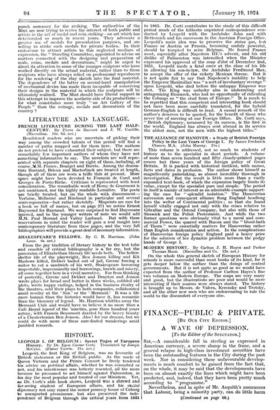HISTORY.
LEOPOLD I. OF BELGIUM : Secret Pages of European History. By Dr. Egon Caesar Corti. Translated by Joseph McCabe. (Fisher Unwin. 21s. net.) Leopold, the first King of Belgium, was no favourite of British statesmen or the British public. As the uncle of Queen Victoria and the Prince Consort he freely tendered his advice on political affairs, whether he was consulted or not, and his interference was bitterly resented, all the more because he presumed to set himself against Palmerston, in :his day the most popular and trusted of our Ministers. Yet, As Dr. Corti's able book shows, Leopold was a shrewd and far-seeing student of European affairs, and his skraul diplomacy not only raised the minor princely house of Coburg to unexpected prominence, but also preserved the inde- pendence of Belgium through the critical years from 1881 to 1865. Dr. Corti contributes to the study of this difficult period much of the hitherto Imprinted correspondence con- ducted by Leopold with the Archduke John and with Metternich and his successors in the Austrian Foreign Office. Leopold's main idea was to preserve the status quo, lest France or Austria or Prussia, becoming unduly powerful, should be tempted to seize Belgium. He feared France most, especially after Napoleon III.'s advent, and his old dislike of Palmerston was intensified when the Minister expressed his approval of the coup d'etat of December 2nd, 1851. Leopold made a fatal error at the close of his life in allowing his son-in-law, the Archduke Ferdinand Max, to accept the offer of the rickety Mexican throne. But it is not quite fair to say that Napoleon's inability to help the Emperor Maximilian was " a sort of involuntary revenge " upon Leopold, who died before the unhappy Emperor was shot. The King was unlucky also in underrating and antagonizing Bismarck, who lost no opportunity of ridiculing the Coburgs as " the stud farm of Europe." It is much to be regretted that this competent and interesting book should not have been more carefully translated, for the hybrid German-English is difficult to read. A casual remark of the author's deserves to be quoted, for the benefit of those who never tire of sneering at our Foreign Office. Dr. Corti says, " British diplomacy, measured by its success, is the first in the world. England has always sent abroad in its service the ablest men, not the men with the highest titles."










































 Previous page
Previous page